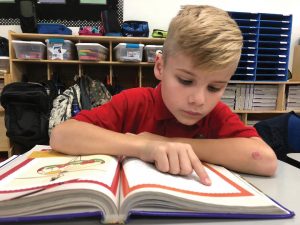 Are you an avid reader? Did you love reading as a child? What did adults in your life do to inculcate such love for reading, which became a lifelong passion?
Are you an avid reader? Did you love reading as a child? What did adults in your life do to inculcate such love for reading, which became a lifelong passion?
To develop a love for reading, you must surround yourself with books. From the day your child is born, read to him. Not only should you read to him, but also read with him, so he becomes accustom to seeing you read. Setting aside a specific time for reading, just before bedtime, sitting together on a couch, creates a lifetime of fond memories of reading together as a family.
Having books around the house, in every room, in the bathroom, on the kitchen table, sends the message to the children that books are important. In their rooms, have bookshelves full of books, attractively decorated and conspicuously placed. Books can be bought at bookstores, library sales or at second hand book stores.
Do also give your child a special book, a favorite childhood book of yours, or maybe a real leather-bound book for keepsake, as a treasure. Let your children know that, indeed, he is fortunate to own books.
Discuss the content of the books you are reading, and help your child connect with the world around her and the places she has never visited. You can say, “Tell me something you read today that you liked.” Imagine the conversation that might take place and the places it might take you.
Once you have created a setting for developing the passion for reading, how does your child become a good reader? Becoming a good reader is more than mastering the big words. Whether your student is just starting to recognize letters, or has been burying her nose in a book for years, we have an opportunity to develop strong readers in our students and in ourselves, and that might look different from what you expect.
In short, being a good reader is being functionally literate, which means you can understand complex issues, abstract ideas and new information after reading about them.
According to Dr. Willingham, a University of Virginia professor and reading expert, reading comprehension depends on several things beyond vocabulary. Readers understand what they read if they already have a foundation of knowledge on the subject matter. Therefore, early education should spend less time on the mechanics of reading and more time on general information in areas like history and science.
At Self Development Academy, we are on the same page as Dr. Willingham, so to speak. Our mission is to raise up lifelong learners with a passion for gaining knowledge in subjects ranging from the arts, to computer programming, to science and mathematics.
As parents, you can help develop young reading minds in your children in several ways:
- Be intentional about content. On your next trip to the library or the bookshelf, help your student venture out past old favorites and into areas of non-fiction, biographies or history. Help your student find a book in which she is both interested and uninformed.
- Consider non-reading activities as literacy boons. Visiting museums, watching historical programs on TV and listening to audio books or podcasts will expand minds and continue to build a larger foundation of knowledge, which will strengthen reading comprehension now and in the future.
- Focus on the mind, not the letters. Can your student correctly sound out antidisestablishmentarianism? Great. Does he know what it means and can he use it in a sentence? Even better. Do the words he reads inform him, help him to make thoughtful opinions, and contribute to the way he sees the world and interacts in it? These questions get to the heart of reading, more than any grade, standardized test or impressive vocabulary word.
Reading helps your children become successful in school and later in life, as they continuously acquire new information through reading. Reading allows you to see others’ perspectives, as well as develop compassion and kindness.
Books are the quietest and most constant of friends; they are the most accessible and wisest of counselors and the most patient of teachers. – Charles W. Eliot
For more information about Self Development Academy and its reading program, please contact us at (480) 641-2640.

